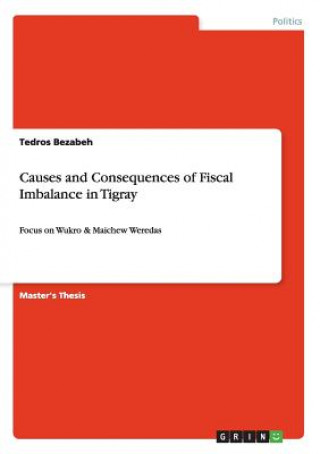
Kód: 05284265
Causes and Consequences of Fiscal Imbalance in Tigray
Autor Tedros Bezabeh
Master's Thesis from the year 2012 in the subject Politics - International Politics - Topic: Miscellaneous, grade: Very Good, , course: Master's Thesis, language: English, abstract: Decentralization refers to division of multidime ... celý popis
- Jazyk:
 Angličtina
Angličtina - Vazba: Brožovaná
- Počet stran: 92
Nakladatelství: Grin Publishing, 2013
- Více informací o knize

Mohlo by se vám také líbit
-

Studies in the Philosophy of Kierkegaard
1681 Kč -

Teacher's Guide to 14-19 Policy and Practice
1159 Kč -

China In World History
867 Kč -

Wonderful Things: Byzantium through its Art
5172 Kč -

Mental Health Issues and the University Student
1948 Kč -

Japanese/Korean Linguistics
2157 Kč -

Unbroken Communion
1736 Kč
Dárkový poukaz: Radost zaručena
- Darujte poukaz v libovolné hodnotě a my se postaráme o zbytek.
- Poukaz se vztahuje na celou naši nabídku.
- Elektronický poukaz vytisknete z e-mailu a můžete ihned darovat.
- Platnost poukazu je 12 měsíců od data vystavení.
Více informací o knize Causes and Consequences of Fiscal Imbalance in Tigray
Nákupem získáte 170 bodů
 Anotace knihy
Anotace knihy
Master's Thesis from the year 2012 in the subject Politics - International Politics - Topic: Miscellaneous, grade: Very Good, , course: Master's Thesis, language: English, abstract: Decentralization refers to division of multidimensional power between the center and sub national governments. Fiscal decentralization is core component of decentralization that gives an autonomous authority to local governments a revenue and expenditure assignments. Though fiscal decentralization has given revenue raising and spending decision powers to lower levels of government, the implementation process has often been a discouraging task for many local authorities in the developing world. In the case of Ethiopia, decentralization has been implemented since 1991. However, vertical as well as horizontal fiscal imbalance still persists at different layers of government. Therefore the core objective of this paper is to assess the causes and consequences of fiscal imbalance in Tigray, focus on Wukro & Maichew. In order to collect the required data, both primary and secondary sources are used. In addition with this, the research also applies qualitative approach and using case study design. Accordingly, at region level, the region only covers 29% of its total expenditure in the last six years. In line with this, Wukro and Maichew Wereda are among the Weredas in Tigray which faces the problem of fiscal imbalance. While Wukro Wereda covers 14.5% of its total expenditure from internal revenue and Maichew only covers only 11.3% of its expenditure. Poor revenue assignment, huge expenditure responsibility, geographical and topographic characteristics and inadequate capacity building activities to raise revenue in the study areas are the causes of fiscal imbalance in the study areas. Restricting expenditure opportunity, affecting service delivery and causes incomplete plan are the major negative implication of fiscal imbalance in the study areas. Accordingly, extending the revenue authority, identifying prioritized expenditure responsibilities, and consolidating intergovernmental fiscal transfer are among the recommended ways of tackling fiscal imbalance in the study areas.
 Parametry knihy
Parametry knihy
Zařazení knihy Knihy v angličtině Society & social sciences Politics & government
1704 Kč
- Plný název: Causes and Consequences of Fiscal Imbalance in Tigray
- Podnázev: Focus on Wukro & Maichew Weredas
- Autor: Tedros Bezabeh
- Jazyk:
 Angličtina
Angličtina - Vazba: Brožovaná
- Počet stran: 92
- EAN: 9783656517429
- ISBN: 3656517428
- ID: 05284265
- Nakladatelství: Grin Publishing
- Hmotnost: 132 g
- Rozměry: 210 × 148 × 6 mm
- Datum vydání: 21. October 2013
Oblíbené z jiného soudku
-

Case Against the Sexual Revolution
392 Kč -

Wretched of the Earth
286 Kč -

The Trigger
586 Kč -

State and Revolution
117 Kč -

Accidental Superpower
455 Kč -

My Autobiography
306 Kč -

Fight Like A Girl
276 Kč -

Against Civilization
389 Kč -

The Lords of Poverty: The Power, Prestige, and Corruption of the International Aid Business
324 Kč -

Politics
1301 Kč -

Cold and the Dark
482 Kč -

Voices from the Contemporary Japanese Feminist Movement
1343 Kč -

Calculus of Consent
403 Kč -

Mafia Monograph, Part 1 of 4
532 Kč -

Entropy Of Capitalism
1124 Kč -

Harm Reduction or Harm Maintenance
781 Kč -

Israel Lobby and U. S. Foreign Policy
710 Kč -

Red Petrograd
554 Kč -

Troubled Constitutional Future
708 Kč -

Lineages of Modernity - A History of Humanity from the Stone Age to Homo Americanus
1098 Kč -

City of Quartz
379 Kč -

Inventing Vietnam
801 Kč -

Flash Boys - A Wall Street Revolt
258 Kč -

Lee Kuan Yew
500 Kč -

Giants
494 Kč -

Children of the Matrix
454 Kč -

Queer Encounters with Communist Power
558 Kč -

Identity
316 Kč -

Deep State
387 Kč -

Next Decade
434 Kč -

Return of Marco Polo's World
410 Kč -

Force of Reason
493 Kč -

STRANGE DEATH OF EUROPE
473 Kč -

Political Science For Dummies
471 Kč -

Yoga of Eating
287 Kč -

Political Brain
359 Kč -

GREEN BOOK
196 Kč -

Politics: A Very Short Introduction
249 Kč -

Out of the Wreckage
482 Kč -

No Turning Back
303 Kč -

Urban Warfare in the Twenty-First Century
673 Kč -

Trade Marketing, Category Management, and Shopper Marketing
2257 Kč -

Spirit of the Laws
623 Kč -

USAF Military Working Dog Program - Scholar's Choice Edition
725 Kč -

Psychology of Politics
555 Kč -

Report From Iron Mountain
366 Kč -

Lies My Teacher Told Me
561 Kč -

Liberalism and Its Critics
854 Kč -

Scramble for Europe, Young Africa on its way to the Old Continent
446 Kč
Osobní odběr Praha, Brno a 12903 dalších
Copyright ©2008-24 nejlevnejsi-knihy.cz Všechna práva vyhrazenaSoukromíCookies



 Vrácení do měsíce
Vrácení do měsíce 571 999 099 (8-15.30h)
571 999 099 (8-15.30h)